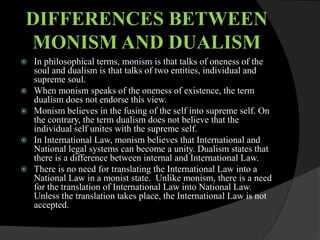Monism and dualism are two philosophical positions that pertain to the nature of reality and the mind. Monism is the view that there is only one ultimate reality, and everything else is derived from it. Dualism, on the other hand, is the belief that there are two distinct and separate realities: the physical world and the mental world. In this essay, I will discuss the main arguments for each of these positions and the implications of each for our understanding of the world and ourselves.
Monism is the belief that there is only one ultimate reality, and everything else is derived from it. According to monism, the universe is a single, unified entity, and everything within it is interconnected and interdependent. This view is often associated with pantheism, the belief that God is the universe itself. Monists believe that the physical world and the mental world are ultimately the same thing, and that there is no real distinction between them.
One argument for monism is that it provides a more coherent and unified explanation of the world. According to monists, dualism creates a dichotomy between the physical and mental realms that is difficult to reconcile. By contrast, monism offers a more seamless and holistic view of reality. It suggests that everything is ultimately interconnected and that the distinctions between different aspects of reality are artificial and arbitrary.
Another argument for monism is that it is more parsimonious, or intellectually economical. Monism suggests that there is only one ultimate reality, rather than two distinct and separate ones. This means that it requires fewer assumptions and postulates to explain the world, and it is therefore a simpler and more elegant theory.
There are also several variations of monism, each with its own distinctive features. Material monism, for example, is the view that everything is ultimately made up of matter, and that mental states and experiences are reducible to physical processes. Ideal monism, on the other hand, is the belief that everything is ultimately made up of consciousness or mind, and that the physical world is an illusion or a projection of the mental realm.
Dualism, by contrast, is the belief that there are two distinct and separate realities: the physical world and the mental world. According to dualism, the mind is a non-physical entity that exists independently of the body and the physical world. Dualists believe that the mind is not reducible to physical processes and that it has its own distinctive properties and characteristics.
One argument for dualism is that it can better account for certain aspects of our experience. For example, dualists point to the subjective nature of mental states and experiences, such as feelings, thoughts, and perceptions, and argue that these cannot be reduced to physical processes. They also point to the fact that mental states can have an impact on physical processes, such as when we move our limbs or speak based on our thoughts and intentions.
Another argument for dualism is that it can provide a more satisfactory explanation for the existence of consciousness and self-awareness. Dualists argue that consciousness cannot be reduced to physical processes, and that it therefore requires a separate, non-physical explanation. They also point to the fact that we have a sense of self and agency, and that we are able to reflect on and introspect our own mental states, which seems difficult to explain purely in terms of physical processes.
There are also several variations of dualism, each with its own distinctive features. Substance dualism, for example, is the belief that the mind and the body are two distinct substances that interact with each other. Property dualism, on the other hand, is the view that the mind and the body are not distinct substances, but that the mind has certain non-physical properties that cannot be reduced







